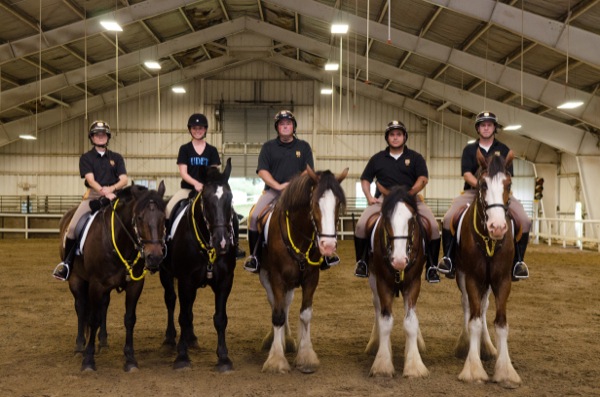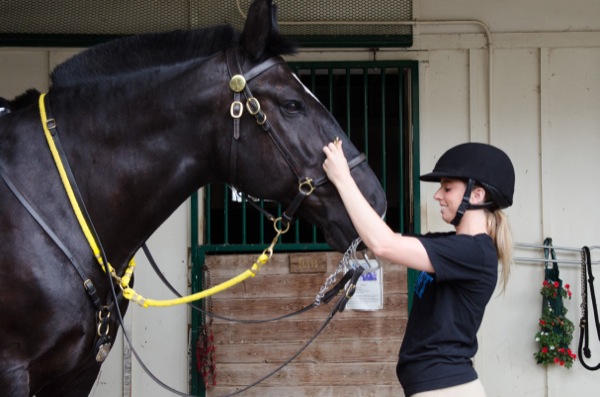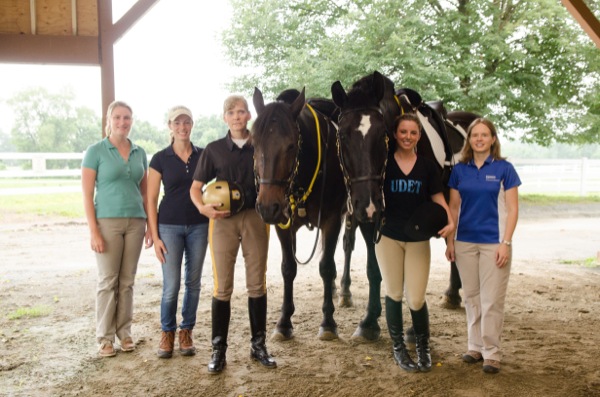Equine enforcement
UD student spends summer with New Castle County Police Mounted Patrol
2:08 p.m., July 15, 2013--University of Delaware student Maggie Curran does not have any background in police work but she does have experience with horses. So when the opportunity arose to spend the summer interning with the New Castle County Police Mounted Patrol, she thought it would be a good chance to combine something new with something she has been doing since she was 6 years old.
Working out of Carousel Park, Curran has been on the job since the second week of June and said her day-to-day routine varies depending on the needs of the mounted unit.
People Stories
'Resilience Engineering'
Reviresco June run
“This internship has been really helpful with my horse skills because I’m here every day working with the horses from 8 a.m. to 4 p.m., and I’m doing different things,” said Curran, a sophomore studying animal science in the College of Agriculture and Natural Resources. “I’m riding, I’m cleaning stalls and equipment, I’m grooming -- all of the things that people don’t really think about outside of riding.”
As to riding, Curran is learning all of the formations used by the county mounted police -- such as the column, the line, the echelon and the L -- and the reasons behind those formations.
“The column is where we’re all following each other. When we’re walking through somewhere, it’s the easiest way to get from one place to another,” she said. “The line is all of us next to each other and that’s what they call the most aggressive formation, where we can line up and move people.
“The echelon is used to peel people off of a wall or a surface and the L is when there are three of us in the front and one behind, and that is for when we’re moving through a crowd and we’re trying to protect a car or a person. They stand right in between the riders in the L.”
Curran pointed out that taking care of 10 horses provides endless learning opportunities, as she encounters something new with at least one of the horses each day.
Specifically, she has been able to assist in the training exercises the three new Clydesdale horses must complete this summer in preparation for the work they will perform as members of the unit.
She said she is also glad that she gets to work at Carousel Park, a place where she used to ride.
NCCPD, UD collaboration
Curran’s internship experience was made possible through a partnership between the county police mounted unit and UD’s Department of Animal and Food Sciences.
The partnership is a collaborative effort between Mary Devine, senior sergeant with the mounted unit, and Carissa Wickens, assistant professor of animal and food sciences, as a means of supporting the work of the unit while providing UD students with a valuable hands-on, equine-focused learning experience.
Laura Nemec, laboratory coordinator in the department, also played an integral role in developing the internship.
“I’m certainly interested in any kind of a community outreach program that might involve the horses or the police department. We are community policing so I said, ‘Sure, come on out, and we’ll talk and we can brainstorm,’ and the internship is what we came up with,” said Devine.
Wickens said she was drawn to the opportunity because it is unique. “Not every state, city or county police force has a mounted division, and very few students would ever have the chance to work with police horses,” said Wickens. “The internship with the New Castle County mounted police unit may present opportunities for further studies designed to investigate characteristics that make horses suitable candidates for police work and/or to assess how horses respond to different training protocols. I also was looking for ways in which we could provide some assistance to the unit.”
She went on to explain that Curran is learning much more than just the basic care of the horses.
“Maggie is learning about the unit and the patrol, the use of these horses and how they’re engaged in the unit’s activities, but moreover, she’s actually getting to see the training protocols involved in acclimating horses to this type of work,” Wickens said. “Equine behavior, temperament and training are all important aspects of mounted police work, and being able to observe the horses’ training and daily routines is a great way for students to learn more about the biology and management of horses as well as to explore additional career options.”
Wickens and Devine both stressed the reciprocal nature of the partnership, how it benefits both UD and the county police, and said that they will look to collaborate more in the future.
As for Curran, Devine said that she is surprised how easily she fit in with the mounted unit.
“It takes a special type of person to adjust and adapt to this unit. We have a lot of fun over here but it’s a lot of work and we work very closely with one another,” said Devine. “There’s a lot of personalities so you really have to meld in with the group, and she’s very flexible, very respectful. We ask her to do something and she’s happy to do it and it speaks volumes about her. She’s been great.”
Devine also said that she is always eager to work with UD, as she said the internships can serve as a great recruiting tool. “If the students get an opportunity to come over and see how we do police work on horseback, maybe they will gain some interest in what we do as police officers,” said Devine.
That seems to be the case with Curran, who admits that she had given little thought to a career as a police officer before beginning her internship with the county.
“Before the internship, I wouldn’t consider myself wanting to be a police officer or anything like that,” said Curran. “I came into this internship more for the horse aspect of it, but it really has been interesting and I will give it a second thought. If I could be in the mounted unit with horses, it’d be awesome to have as your day-to-day job.”
Article by Adam Thomas
Photos by Danielle Quigley













